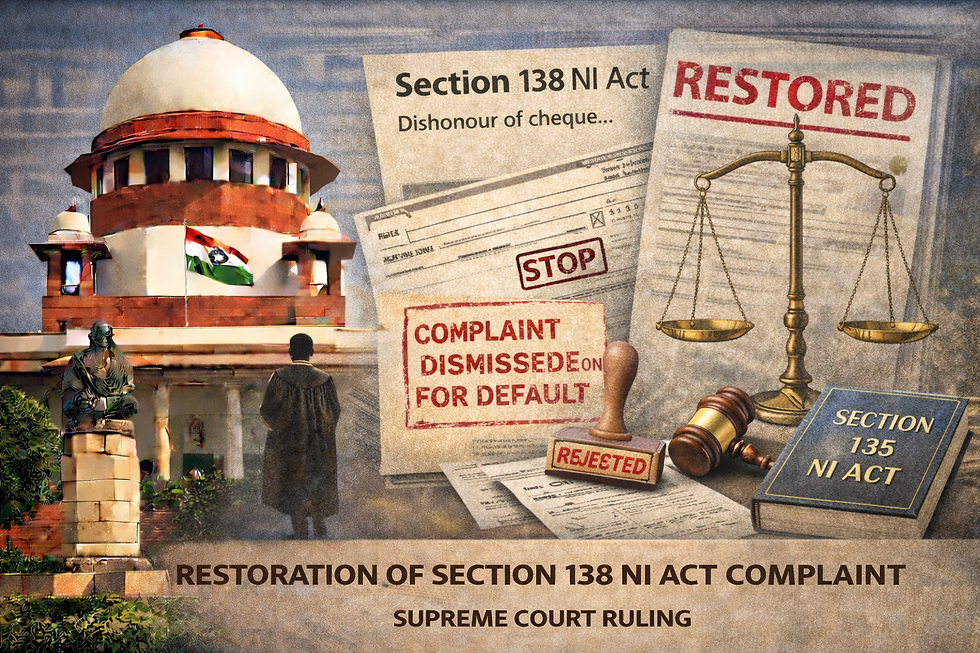Pensionary Benefits Cannot Be Extended Without Legal Justification – Supreme Court's Ruling on Job Contract Employees
- Chintan Shah

- Feb 24, 2025
- 4 min read
Summary of the Judgment
Case Name: State of Odisha & Ors. v. Sudhansu Sekhar Jena & Ors.
Date of Judgment: 21st February 2025
Bench: Hon'ble Justice Sudhanshu Dhulia
Advocates: Senior Advocate Shri P.S. Patwalia for the appellants; Counsel for the respondents not specifically named
Acts and Sections: Odisha Civil Services (Pension) Rules, 1992, Article 14 of the Constitution of India
Cited Judgments:
Prem Singh v. State of Uttar Pradesh & Others (2019) 10 SCC 516
Uday Pratap Thakur & Another v. The State of Bihar & Others (2023) SCC OnLine SC 527
Settlement Class-IV Job Contract Employees Union, Balasore v. State of Odisha & Ors. (O.J.C No.2147/1991)
Bhagaban Pattnaik v. State of Odisha (T.A No.11/1993)
Nityanand Biswal v. State of Odisha & Ors. [O.A No.3020(C)/2003]
Judhistir Padhy v. State of Odisha & Ors. [W.P.C (OAC) No. 2276/2012]
Chintamani Panda v. State of Odisha & Ors. [W.P.C (OAC) No.3741/2015]
Pitambar Hota v. State of Odisha [W.P.C (OAC) No.2622/2015]
Background of the Case
The present case revolves around the claim of job contract employees in Odisha for pensionary benefits. Historically, job contractors were engaged in tasks such as survey work and land consolidation but were not considered part of a pensionable establishment. The Odisha Civil Services (Pension) Rules, 1992, explicitly excluded job contract service from being counted for pension purposes.
A Division Bench of the Orissa High Court, in its earlier ruling, had directed the inclusion of the entire period of job contract service for pension calculations, leading to an appeal by the State of Odisha.
Key Issues Before the Court
Whether job contract employees, upon regularisation, are entitled to have their entire service period counted for pensionary benefits.
Whether the classification between work-charged employees and job contract employees is artificial and violative of Article 14 of the Constitution.
Whether the High Court’s direction to count the entire service period was legally tenable.
Court’s Reasoning and Findings
Distinction Between Work-Charged and Job Contract Employees
The Hon'ble Supreme Court made a crucial distinction between work-charged employees and job contract employees. Work-charged employees are covered under specific government schemes and their services, upon regularisation, have been recognised for pension eligibility. However, job contract employees were hired under different conditions and were never part of a pensionable establishment.
"We must put on record the distinction between work-charged employees and job contractors. Although this point was never argued before this Court by any of the two parties, we must nevertheless, in all fairness, state the law as it stands today."
The Court reiterated that the distinction was not artificial, as job contractors were engaged in specific tasks without the expectation of long-term government service.
Relying on Precedents
The Court referred to Prem Singh v. State of Uttar Pradesh & Others (2019) 10 SCC 516, which allowed pensionary benefits for work-charged employees. However, it clarified that the ruling was not applicable to job contract employees. Instead, the Court found the Uday Pratap Thakur (2023) SCC OnLine SC 527 ruling to be relevant, which denied full pension benefits to employees whose service rules explicitly excluded such benefits.
"The reliance placed upon Prem Singh (supra) by the learned counsel appearing on behalf of the appellants is absolutely misplaced."
Government's Inaction and Delay
The judgment also took a strong stance against the Odisha government’s lethargic approach in handling these cases. The Court criticised the repeated filing of Special Leave Petitions (SLPs) with significant delays, leading to dismissals on procedural grounds.
"The casual manner in which the State authorities, particularly the concerned department of the State and the Land Records Office, have handled the matters is a matter of concern."
Due to this delay, the Court imposed costs of ₹1,50,000 on the State for each employee affected, to be deposited within four weeks.
Further Observations from the Judgment
Judicial Scrutiny of Employment Policies
The Court scrutinised how the State has handled employment policies over the years. The distinction between different categories of employees needs to be rational, and arbitrary exclusions can be challenged under Article 14 of the Constitution.
Implications of the Ruling on Future Pension Claims
The ruling sets a clear precedent that contractual employment terms must be evaluated carefully. Employees seeking pensionary benefits must meet specific service criteria, and exceptions cannot be granted solely on humanitarian grounds unless supported by law.
"Pensionary benefits cannot be extended in the absence of a legal framework that justifies such inclusion."
Conclusion
The Supreme Court ultimately set aside the Orissa High Court’s decision, holding that job contract employees are not entitled to have their entire service counted for pension. The Court maintained the distinction between work-charged and job contract employees, reinforcing that pension benefits are contingent on being part of a pensionable establishment.
This ruling has significant implications:
For Government Employees: It reinforces the existing legal framework distinguishing different categories of employment and their respective benefits.
For Future Litigation: It sets a precedent against judicial intervention in well-established service rules unless there is clear constitutional infirmity.
For the State Administration: It highlights the importance of timely litigation management and adherence to procedural rules.
This judgment serves as a crucial reference in service jurisprudence, particularly in cases concerning contractual employment and pension eligibility.



Comments